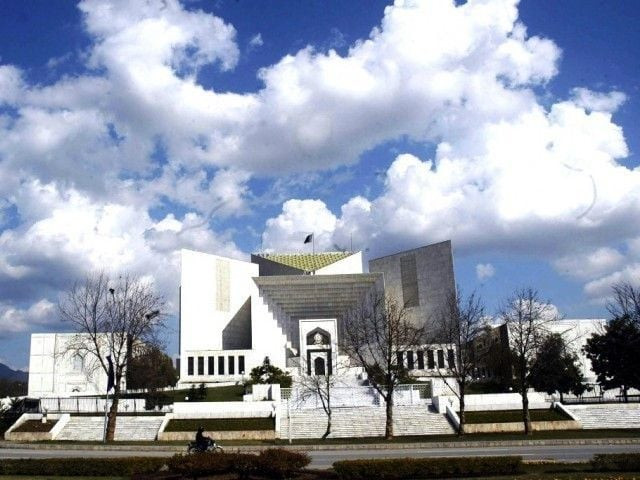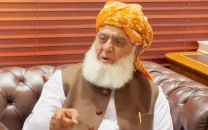When facts admitted, no need for inquiry: SC judges
Sacked judge Siddiqui’s counsel argues SJC removed petitioner without inquiry

As Supreme Court on Monday resumed hearing of a petition against removal of the former Islamabad High Court (IHC) judge, Justice Shaukat Aziz Siddiqui, by the Supreme Judicial Council (SJC) two years ago, one member of the bench, Justice Ijazul Ahsan, observed that when facts are admitted, there is no need for a proper inquiry.
“It’s happening in every department that when facts are admitted, there is no need for an inquiry,” Justice Ahsan remarked.
Justice Umar Ata Bandial, who is heading a five-judge larger bench, also endorsed Justice Ahsan’s view, saying that when facts are admitted, there is no need for cross examination.
Justice Ahsan noted that perhaps the SJC had proceeded on the fact that contents of the sacked judge's speech were not disputed.
Another judge, Justice Sardar Tariq Masood also noted that when facts are admitted, there is no need for an inquiry.
Earlier, sacked judge’s counsel Hamid Khan contended that the SJC removed petitioner without conducting a proper inquiry. “Even a show-cause notice was issued without following the procedure,” he added.
“A judge should not be thrown out without an inquiry,” Khan said. “There is a need to conduct inquiry on the allegations levelled by the petitioner in his speech.”
However, the bench questioned, “Is it not unbecoming of a judge to level allegations against his own chief justice.”
Khan replied that there are hundreds of precedents wherein a judge spoke with bar associations.
However, leading judge Justice Bandial noted that perhaps he was referring to former CJP Iftikhar
Muhammad Chaudhry’s speeches in bar associations when he was deposed in March 2007.
Justice Bandial told the counsel that the former CJP never accused anyone in his speeches as he only spoke about law but he was able to get public support.
Justice Bandial asked the counsel to read out Shaukat Aziz Siddiqui’s speech on the basis of which he was removed.
When Khan was going to start reading, the bench adjourned the hearing until tomorrow (Wednesday).SJC opinion
On July 31, 2018, the SJC issued a show-cause notice to Justice Siddiqui on a reference for making unnecessary and unwarranted comments at the Rawalpindi District Bar Association by accusing the establishment of manipulating the judicial proceedings. He was removed as judge of the IHC in October 2018.
In his speech at the Rawalpindi District Bar Association on July 21, 2018, Justice Siddiqui targeted the country’s top spy agency and accused it of manipulating the judicial proceedings.
The SJC unanimously stated that while delivering the speech before the District Bar Association in Rawalpindi on July 21, Siddiqui displayed conduct unbecoming of a high court judge.
Terming Siddiqui of guilty of misconduct, it stated that therefore, he was liable to be removed from his office under Article 209 (6) of the Constitution.
Justice Asif Saeed Khosa, who is the senior most among SC judges, wrote in the 39-page report that Justice Siddiqui did not even spare the Supreme Court when he remarked that he knew who sent messages to the apex court and who delivered them.
Such reckless and irresponsible conduct of a high court judge was “not countenanced by any standard of judicial propriety and the Code of Conduct in this country is no exception in that regard”, the report stated.
The council also questioned the justice’s motive for meeting with army officials.Justice Siddiqui’s petition
In his petition, Justice Siddiqui contended that he had been sacked without a proper inquiry to prove the claims he made during his controversial speech at the Rawalpindi District Bar Association. Challenging his removal, Siddiqui raised serious allegations of “bias” against the former CJP, who was also the SJC chairman.
In the 30-page appeal, the former judge explained the context in which he was compelled to address the bar association and utter remarks about alleged involvement of certain officers from the executive organ of the state in affairs of the judiciary and alleged manipulation in formation of benches.
“The remarks made by the petitioner [Mr Siddiqui] were an honest attempt demanded by his conscience to counter the challenges posed to the independence of judiciary,” the appeal argued.
In the appeal, Justice Siddiqui recalled how he had issued orders on June 29 and August 18 to clear roads and a green belt outside the Inter-Services Intelligence (ISI) headquarters.
Consequently, he added, a senior official of the ISI — named in the petition — visited him at his residence and asked him to review the decision and when he refused, expressed annoyance.
Subsequently, the appeal said, another high-ranking official of the ISI — also named in the petition — approached the former judge at his residence on June 29 to apologise for the conduct of his subordinate and suggested some guidance to protect the prestige of the institution by modifying the orders.
The petition said the former judge had explained that he could not go beyond his orders and, therefore, the same should be respected and implemented unless set aside or modified by the Supreme Court.
Seeing his reluctance, the petition contended, the high-ranking official agreed and assured that the ISI would proceed in accordance with the law, but requested others present in the room to leave as he intended to talk to the former judge in private.
Thereafter, the petition said, the ISI official inquired about the procedure of hearing of appeals filed by former prime minister Nawaz Sharif in the high court against his conviction by an accountability court.



















COMMENTS
Comments are moderated and generally will be posted if they are on-topic and not abusive.
For more information, please see our Comments FAQ